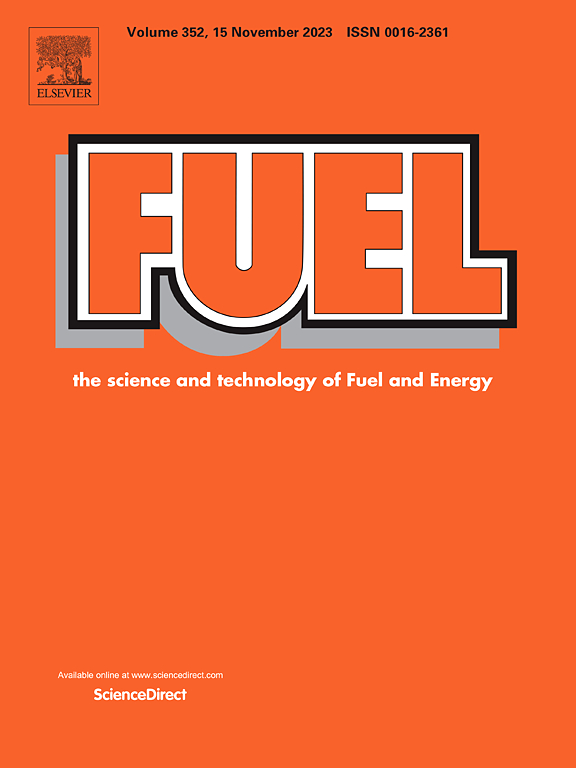MCM-22/ZSM-5核壳结构沸石的制备及其催化裂化聚乙烯选择性生产对二甲苯的研究
IF 7.5
1区 工程技术
Q2 ENERGY & FUELS
引用次数: 0
摘要
采用水热结晶(形成MCM-22核心)和蒸汽辅助结晶(形成ZSM-5外壳)相结合的方法合成了核壳结构的MCM-22/ZSM-5分子筛(MZCS50)。MCM-22的核呈层状饼状,直径为3 ~ 4µm,而ZSM-5的壳由聚集的纳米颗粒组成。MZCS50具有高比表面积,微孔-中孔共存结构,是Brønsted酸优势材料。以MZCS50为催化剂,对低密度聚乙烯(LDPE)进行裂解制备BTEX(苯、甲苯、乙苯和二甲苯)。结果表明,550℃为LDPE开裂的最佳温度。最大产液率为23.4%,对BTEX、二甲苯和对二甲苯的选择性分别为79.8%、43.2%和21.3%。多次裂化实验表明,MZCS50在甲苯制二甲苯和二甲苯异构体进一步转化对二甲苯方面具有良好的稳定性和优异的催化性能。这些结果表明,核壳结构的MZCS50是一种很有前途的将塑料废物转化为有价对二甲苯的催化剂。本文章由计算机程序翻译,如有差异,请以英文原文为准。
Preparation of MCM-22/ZSM-5 core–shell structured zeolite for catalytic cracking of polyethylene to selectively produce paraxylene
The core–shell structured MCM-22/ZSM-5 zeolite (MZCS50) was synthesized through a combination of hydrothermal crystallization (to form the MCM-22 core) and steam-assisted crystallization (to form the ZSM-5 shell). The MCM-22 core exhibited lamellar cake-like shape with a diameter of 3 ∼ 4 µm, while the ZSM-5 shell consisted of aggregated nanoparticles. MZCS50 possessed a high specific surface area, a micropore-mesopore coexisting structure, and was Brønsted acid-dominant material. MZCS50 was used as a catalyst for the cracking of low-density polyethylene (LDPE) to produce BTEX (benzene, toluene, ethylbenzene and xylenes). The results showed that 550 °C was the optimal temperature for LDPE cracking. The maximum liquid yield achieved was 23.4 %, with selectivities to BTEX, xylenes and p-xylene of 79.8 %, 43.2 %, and 21.3 %, respectively. Repeated cracking experiments demonstrated that MZCS50 exhibited good stability and superior catalytic performance in converting toluene to xylenes and further transforming xylene isomers into p-xylene. These results indicate that the core–shell structured MZCS50 is a promising catalyst for converting plastic wastes into valuable p-xylene.
求助全文
通过发布文献求助,成功后即可免费获取论文全文。
去求助
来源期刊

Fuel
工程技术-工程:化工
CiteScore
12.80
自引率
20.30%
发文量
3506
审稿时长
64 days
期刊介绍:
The exploration of energy sources remains a critical matter of study. For the past nine decades, fuel has consistently held the forefront in primary research efforts within the field of energy science. This area of investigation encompasses a wide range of subjects, with a particular emphasis on emerging concerns like environmental factors and pollution.
 求助内容:
求助内容: 应助结果提醒方式:
应助结果提醒方式:


